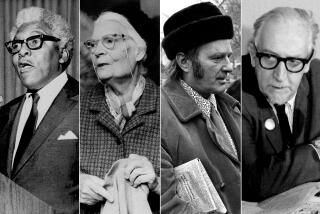Presbyterian Peacemaking Is Criticized
- Share via
NEW YORK — Congregations throughout the Presbyterian Church (USA) are studying a controversial proposed position paper: “Presbyterians and Peacemaking--Are We Now Called to Resistance?”
Critics, including current and former military officers and government officials, say, however, that the paper is slanted in favor of pacifism and “all kinds of resistance to anything considered to be militaristic.”
The study document, which seeks responses from congregations in the 3.1-million-member denomination, could be presented for a vote to the 1988 general assembly of the church as its official policy.
“If nuclear weapons and worldwide militarism are indeed demonic, resistance may be called for as a matter of faith, not merely as a social action strategy,” the study paper declares.
“Resistance would be a stance characterized by repentance and . . . commitment to transformation. It would involve standing against the policies of government that perpetuate reliance on nuclear weapons and promote militarism, and it would involve political struggle to transform these policies in fundamental ways that more clearly correspond to God’s intention for humankind.”
Among forms of resistance that the proposal says Presbyterians should consider are refusal to pay income taxes, withdrawal of funds from companies with military contracts, quitting jobs in military-related firms, non-cooperation with military service, participation in demonstrations, and involvement in other peacemaking organizations.
The paper has drawn sharp criticism from a wide range of critics.
In a recent letter to James Andrews, chief executive of the denomination, 16 Presbyterians--including Robert McFarlane, former national security adviser to President Reagan--said they believed that the study document needs to be balanced with other views.
“We are brought together by a shared belief that real peace can be achieved only through the maintenance of a strong national defense and urge continuing negotiations by responsible officials of our government.
“The major threat to world peace at this time originates with totalitarian communism of the Soviet Union,” the critics said.
Many of the signers have served as professionals in the government and as military officers.
More to Read
Sign up for Essential California
The most important California stories and recommendations in your inbox every morning.
You may occasionally receive promotional content from the Los Angeles Times.













